Thursday, March 2nd 2017

AMD's Ryzen Debut: Onwards to the HEDT Market or The Stumbling Hype Train
I should break down the bad news first: we here at TechPowerUp won't be able to provide you with a timely, straight-from-the-oven Ryzen review. Like some other publications, our Ryzen review sample failed to arrive on time. And trust us - we did will it to do so as much as we could, risking a Stranger-Things-esque nosebleed. Alas, to no avail.
The good news is that while we won't be able to offer you our own review of AMD and Jim Kellers' latest high-performance x86 brainchild, we will still strive to bring you meaningful coverage on it. This article aims to make an overall aggregation on review consensus, benchmarks and capabilities of the newest AMD CPU. Trying to add something, we'll also try and evaluate whether AMD learned - or didn't learn - something from its Bulldozer launch fiasco, in a pure marketing perspective. This will justify the editorialized nature of this article, but only after we dive straight to the numbers. Without further ado, follow on to the numbers.Multimedia, Encoding, Scientific
Reviews show consensus in that Ryzen is a powerhouse of a processor when it comes to multimedia and encoding workloads, mostly crushing Intel's competition - even in comparisons between chips with an identical number of cores. We've taken results from AnandTech, Tom's Hardware, Techspot, and Ars Technica, so as to be able to show you what different publications achieved with their Ryzen samples.The results really do speak from themselves: AMD's Ryzen are beastly workstation CPUs, pulverizing any competition that Intel has to offer purely in price/performance ratio - and yes, what you see up there is a $499, 95W Ryzen 7 1800X offering more than double the price/performance ratio of Intel's $1089, 140 W i7 6900K. What this represents is AMD's best-case scenario of optimization and performance, and here you can see where all the hype landed: AMD's ZEN architecture posting amazing single-threaded scores in Cinebench against all Intel processors that are even remotely clocked at the same levels. AMD seemingly has the best architecture for these kinds of workloads. Office, scientific, multimedia and encoding workloads seem to be the best fit for AMD's Ryzen, with reviewers far and wide praising the performance and power consumption in these scenarios. AMD truly delivered on the hype train, at least on this side of the equation.
While their chip may not be the fastest in every single benchmark, once you take into account some measure of pricing/performance considerations, Intel's solutions fall flat. The Ryzen 7 1800X absolutely trounces - and I mean, trounces - Intel's i7-6900K and i7-6950X in any performance/watt scenarios, which has typically been a hard playground for AMD. AMD's Ryzen is nothing short of a miracle for AMD in performance/watt terms, and is a culmination of the hype train AMD so thoroughly rode. AMD's Ryzen debut challenges even Kaby Lake in the per-core/power equation, something most of us never dreamed of seeing before. This, backed by AMD's almost revolutionary jump in IPC and single-thread performance, really is a chip to end all others, such as it stands.
Another point to consider is that AMD's Ryzen platform does all of this with measly dual-channel memory, and still goes on to beat Intel's HEDT designs which feature quad-channel memory. This really does go on to show how Intel's approach to the market and its processor and platform design has been clouded in smoke and mirrors, with no real performance advantages to be derived from them.
Gaming
Gaming, however, is another story. If you're looking for the best performer, bar none, for gaming, and have no other use for your PC's beating heart, the Core i7-7700K still remains your best performance bet, due to its inherently strong architecture and freak core-clocks. While AMD doesn't in any way steal the gaming crown from Intel, they did a damn good job at getting back on the gamer's radar. Ryzen is, above all, a competent performer, and a far cry from AMD's defunct Bulldozer and derivatives.Overall, AMD's solutions are slower than their Intel counterparts in pure FPS terms. Sometimes, the actual difference, while favoring Intel's CPUs, is negligible in pure fluidity terms; in others, the difference is markedly in Intel's favor. However, we can be looking at some bugs and needed optimizations on Ryzen's microcode and software updates for gaming and applications. AMD is fast to claim that it's working with software developers to patch and improve Ryzen support, claiming that its architecture is different enough to warrant some performance outliers. If one looks towards gaming at higher resolutions and with all eye-candy turned up to 11, however, like most of us like to play, suddenly the differences between chips seem to be minimal. Furthermore, AMD has recognized that its gaming performance needs improving, and says it expects "higher performance to occur throughout Q1 and Q2" as it works with developers and engine-makers to get Ryzen up to snuff. Oxide Games' Brad Wardell, for one, mentioned that Ashes of the Singularity currently isn't optimized for Ryzen, and promised future updates would increase performance.
Other things seem to point to some underlying issues: some games show better performance with AMD's SMT disabled. AMD also says that Window's power profiles may adversely affect performance, recommending the SO's High Performance Profile. Also, some games show higher performance on Ryzen with their DX12 code-paths (Hitman), while others show lower performance with it (Rise of the Tomb Raider.) AMD also suggest disabling the HPET (High Precision Event Timer), either in the BIOS or operating system, to gain a 5-8% advantage. AMD has also reportedly informed technology partners about the need to improve microcode on Ryzen in regards to memory performance, which could be negatively affecting performance. AMD has apparently ut all of its available microcode optimizations in time for launch on the CPU cores side of the equation, somewhat leaving memory throughput, performance and latency a little on the green side. This could very well be part of the reason why the Ryzen processors don't fare so well under gaming environments.
Review consensus: AMD's Ryzen chips are promising, but are mostly - and at least for now - superseded by Intel's quad-core i7-7700K (as are most processors in Intel's line-up, for that matter), in pure gaming terms. If gaming is your primary concern, the best performing one is still the i7-7700K. This is surely disappointing from a hype-train perspective. And even if one can call AMD's Ryzen processors disappointing in gaming terms, one can also surely call Intel's chips disappointing in multimedia and encoding tasks after seeing Ryzen's debut. It's a shame, considering all the fuss about low-level APIs, DirectX 12, and all the uttered advantages of the PS4 and XBOX One multi-core CPU approaches that some more improvements still haven't been done in regards to multi-threading capability and core scalability in gaming. A last note goes to AMD's improvement over its defunct Bulldozer architecture: the improvements are such that it starts looking ridiculous.
One other thing some reviewers touched upon was gaming fluidity. Whereas Intel's i7-7700K may often post the best results in pure FPS terms, some reviewers pointed towards a prevalence of dropped frames on Intel's processor - slight hiccups in gaming that mar the otherwise stellar experience. Apparently, AMD's Ryzen 7 processors feature no such hiccups, beating Intel's i7-7700K in that regard. It is a case, it seems, of subjective experience carrying something unseen by FPS counters - to a certain degree.
Overclocking
Overclocking on Ryzen 7's chips seems to top out at 4.1 GHz (from its stock 3.6 GHz), with Techspot's Steven Walton achieving that clockspeed with a 1800X, with voltage on auto, which saw the motherboard boosting it to around 1.35v when under load. The 1700X chip, however, only managed to make 3.95GHz (from its stock 3.4 GHz). Other reviewers seemed to hit the same walls, at least on air-cooling. This seems to point to a degree of binning in the chip's allocation to either 1800X or 1700X, as would be expected, and seems to point towards a 500 MHz overclocking ceiling .
Paul Alcorn over at Tom's Hardware managed to achieve a Prime95-stable 4 GHz clock rate at 1.425V using Asus' Crosshair V Hero (with load-line calibration set to Auto), with the highest temperature being at 82°C during the stress test.
A slight note to AMD's Ryzen Master software, which the company debuted alongside its Ryzen processors, which allows you to tune a number of variables, such as the CPU's ratio multiplier, voltage, and memory speeds, from inside the operating system.The bottom line
AMD arguably did everything right in the build-up to its Ryzen launch, the company's premier new CPU architecture that's touted to finally make it a serious contender to Intel's domination of the high-performance x86 architecture. With an under-performing and seriously outgunned architecture design on its Bulldozer line of processors - which married brains and brawn in all the wrong places - AMD found itself on a downhill battle for market share. Coupled with an over-promising, over-reaching marketing campaign, the consensus from the enthusiast community was a deserved one for AMD: the company had blatantly lied with regards to its CPUs prowess and capabilities. Lofty performance claims were the bullet-ridden corpses of AMD's dreams, made to cover a single fact: Bulldozer wasn't good enough for its surrounding environment.
A multitude of variables contributed to this particular equation: the cost in time and resources to develop with a multi-threaded workload in mind; the fact that the vast majority of consumers still carried either dual-core or quad-core systems; and Intel's own stance on the processor market, leveraging its indubitably better CPU architecture towards a steady stream of quantifiable yet unremarkable improvements over the years... Whilst keeping core-count increases away from the mainstream market through wallet-murdering pricing. Coupled with a slower than expected transition to GPU-leveraged computing tasks meant AMD's Bulldozer was ill-suited for the workloads that actually existed, much to the chagrin of many customers: that the 4-module, 8-thread 3.6GHz FX-8150 (Zambezi) generally (yet not always) led the 3.3GHz 6-core, 6-thread Phenom II X6 1100T (Thuban) K10 - but generally fell flat, performance-wise, of the 3.3GHz 4-core, 4-thread Core i5-2500 (Sandy Bridge). Lofty performance goals were cried from terraces, but when plied with scrutiny... Failed to keep in balance.
AMD's vision for Bulldozer hinged on the belief for fastly-developing multi-threaded workloads and the precipitous offload of floating point workloads to GPUs. This belief stemmed from AMD's much vaunted, then downplayed, Fusion strategy: the integration of CPU cores and GPU cores into accelerated processing units (APUs) so that mathematical tasks can use the GPU cores. Bulldozer was supposed to usher in a multi-threaded, GPU compute accelerated world. Thus, the problem with Bulldozer stemmed partly from an excessive confidence in the computing and software ecosystems. But it also has to be said that AMD maybe sacrificed too much, too soon, in regards to its generally strong K10 architecture in the pursuit of higher parallelization. The software of those days benefited from strong single-threaded performance. And until now, not much has changed (as Bulldozer's iterations can attest), and most likely won't change. Intel's decade-long approach - to have fewer, wider cores, and extract higher parallelism through the usage of Hyper-Threading - is now AMD's own as well.
Cue the Ryzen launch, and it would almost seem to be mirroring AMD's Bulldozer claims: lofty 40% improvement over the previous architecture claims were met with lukewarm enthusiasm and mild distrust from general consumers, enthusiasts and tech industry experts alike. That a company worth many times less than Intel, with a fraction of it's R&D budget, and which bled money for years, tearing itself apart with spin-offs, sales and lease-back of their own infrastructures could manage to achieve that kind of a performance uptick was a hard pill to swallow. And even so -that would hardly make it competitive with Intel's products. Follow the trickle of leaks and performance hints grew to instill confidence and enthusiasm in the x86 landscape as few times before it.
Ryzen is a return to form by AMD: a simultaneous return to the fold of the slowly-advancing ecosystem, with strong single-thread performance (right up within Intel's range), amazing multi-thread performance, and a level playing field with Intel through the use of SMT; and a look ahead at the future, with the company firmly planting its roots on a higher core-count approach without sacrificing single-threaded performance. It's one of those rare cases of having your cake and eating it too: AMD's Ryzen debut is a serious shakedown of the high-performance x86 market, having prompted various responses from Intel even before the chips were in consumers' hands. With Ryzen being what it is, and costing what it does, AMD will be stoking the furnaces at Intel for some much-delayed innovation and advancements - even if simply in core-count terms. AMD is by no means a saint, but in this case, this is most likely a turning point in the entire x86 hardware and software ecosystem - prompting a race for the pursuit of no holds-barred, increasingly-higher performance and core counts. That AMD's Ryzen is a tad disappointing in gaming terms has a measure of truth - though those differences seem to fade in high-settings, full-blown graphical presentations. But that AMD's Ryzen is a market-bending force in the multimedia, encoding and scientific workloads is a fact unto itself. And if you throw price-performance considerations into the mix, AMD's Ryzen is close to the second coming of the high-performance x86 market. It's not perfect. But it's definitely great.
AMD's toils resulted in Ryzen. A new horizon in the high-performance computing segment. And now, the ball is firmly in Intel's court, and I for one am eagerly expecting the blue giant's move.
Late edit: A last note goes to the fact that AMD's stock fell by 5.3% during the first two hours of Ryzen's launch. However, the trend has already reversed. As always, when a given product fails to hit all of the impossible marks set upon it by a hype train, Wall Street knee-jerks. However, I would say that the overturning that has already happened is here to stay, and will continue climbing to somewhere closer to AMD's pre-Ryzen-launch levels. Ryzen is a great chip, and has the potential to completely turn things around in the workstation and server market if its execution goes as planned, and even its gaming performance is subject to some measure of improvement in the coming months. AMD managed to deliver an incredible architecture from a very tight spot. Everyone will be able to see that, in time. But now, we're all still reeling from some measure of broken dreams and impossible expectations.
Sources:
Techspot, Tom's Hardware, AnandTech, ArsTechnica
The good news is that while we won't be able to offer you our own review of AMD and Jim Kellers' latest high-performance x86 brainchild, we will still strive to bring you meaningful coverage on it. This article aims to make an overall aggregation on review consensus, benchmarks and capabilities of the newest AMD CPU. Trying to add something, we'll also try and evaluate whether AMD learned - or didn't learn - something from its Bulldozer launch fiasco, in a pure marketing perspective. This will justify the editorialized nature of this article, but only after we dive straight to the numbers. Without further ado, follow on to the numbers.Multimedia, Encoding, Scientific
Reviews show consensus in that Ryzen is a powerhouse of a processor when it comes to multimedia and encoding workloads, mostly crushing Intel's competition - even in comparisons between chips with an identical number of cores. We've taken results from AnandTech, Tom's Hardware, Techspot, and Ars Technica, so as to be able to show you what different publications achieved with their Ryzen samples.The results really do speak from themselves: AMD's Ryzen are beastly workstation CPUs, pulverizing any competition that Intel has to offer purely in price/performance ratio - and yes, what you see up there is a $499, 95W Ryzen 7 1800X offering more than double the price/performance ratio of Intel's $1089, 140 W i7 6900K. What this represents is AMD's best-case scenario of optimization and performance, and here you can see where all the hype landed: AMD's ZEN architecture posting amazing single-threaded scores in Cinebench against all Intel processors that are even remotely clocked at the same levels. AMD seemingly has the best architecture for these kinds of workloads. Office, scientific, multimedia and encoding workloads seem to be the best fit for AMD's Ryzen, with reviewers far and wide praising the performance and power consumption in these scenarios. AMD truly delivered on the hype train, at least on this side of the equation.
While their chip may not be the fastest in every single benchmark, once you take into account some measure of pricing/performance considerations, Intel's solutions fall flat. The Ryzen 7 1800X absolutely trounces - and I mean, trounces - Intel's i7-6900K and i7-6950X in any performance/watt scenarios, which has typically been a hard playground for AMD. AMD's Ryzen is nothing short of a miracle for AMD in performance/watt terms, and is a culmination of the hype train AMD so thoroughly rode. AMD's Ryzen debut challenges even Kaby Lake in the per-core/power equation, something most of us never dreamed of seeing before. This, backed by AMD's almost revolutionary jump in IPC and single-thread performance, really is a chip to end all others, such as it stands.
Another point to consider is that AMD's Ryzen platform does all of this with measly dual-channel memory, and still goes on to beat Intel's HEDT designs which feature quad-channel memory. This really does go on to show how Intel's approach to the market and its processor and platform design has been clouded in smoke and mirrors, with no real performance advantages to be derived from them.
Gaming
Gaming, however, is another story. If you're looking for the best performer, bar none, for gaming, and have no other use for your PC's beating heart, the Core i7-7700K still remains your best performance bet, due to its inherently strong architecture and freak core-clocks. While AMD doesn't in any way steal the gaming crown from Intel, they did a damn good job at getting back on the gamer's radar. Ryzen is, above all, a competent performer, and a far cry from AMD's defunct Bulldozer and derivatives.Overall, AMD's solutions are slower than their Intel counterparts in pure FPS terms. Sometimes, the actual difference, while favoring Intel's CPUs, is negligible in pure fluidity terms; in others, the difference is markedly in Intel's favor. However, we can be looking at some bugs and needed optimizations on Ryzen's microcode and software updates for gaming and applications. AMD is fast to claim that it's working with software developers to patch and improve Ryzen support, claiming that its architecture is different enough to warrant some performance outliers. If one looks towards gaming at higher resolutions and with all eye-candy turned up to 11, however, like most of us like to play, suddenly the differences between chips seem to be minimal. Furthermore, AMD has recognized that its gaming performance needs improving, and says it expects "higher performance to occur throughout Q1 and Q2" as it works with developers and engine-makers to get Ryzen up to snuff. Oxide Games' Brad Wardell, for one, mentioned that Ashes of the Singularity currently isn't optimized for Ryzen, and promised future updates would increase performance.
Other things seem to point to some underlying issues: some games show better performance with AMD's SMT disabled. AMD also says that Window's power profiles may adversely affect performance, recommending the SO's High Performance Profile. Also, some games show higher performance on Ryzen with their DX12 code-paths (Hitman), while others show lower performance with it (Rise of the Tomb Raider.) AMD also suggest disabling the HPET (High Precision Event Timer), either in the BIOS or operating system, to gain a 5-8% advantage. AMD has also reportedly informed technology partners about the need to improve microcode on Ryzen in regards to memory performance, which could be negatively affecting performance. AMD has apparently ut all of its available microcode optimizations in time for launch on the CPU cores side of the equation, somewhat leaving memory throughput, performance and latency a little on the green side. This could very well be part of the reason why the Ryzen processors don't fare so well under gaming environments.
Review consensus: AMD's Ryzen chips are promising, but are mostly - and at least for now - superseded by Intel's quad-core i7-7700K (as are most processors in Intel's line-up, for that matter), in pure gaming terms. If gaming is your primary concern, the best performing one is still the i7-7700K. This is surely disappointing from a hype-train perspective. And even if one can call AMD's Ryzen processors disappointing in gaming terms, one can also surely call Intel's chips disappointing in multimedia and encoding tasks after seeing Ryzen's debut. It's a shame, considering all the fuss about low-level APIs, DirectX 12, and all the uttered advantages of the PS4 and XBOX One multi-core CPU approaches that some more improvements still haven't been done in regards to multi-threading capability and core scalability in gaming. A last note goes to AMD's improvement over its defunct Bulldozer architecture: the improvements are such that it starts looking ridiculous.
One other thing some reviewers touched upon was gaming fluidity. Whereas Intel's i7-7700K may often post the best results in pure FPS terms, some reviewers pointed towards a prevalence of dropped frames on Intel's processor - slight hiccups in gaming that mar the otherwise stellar experience. Apparently, AMD's Ryzen 7 processors feature no such hiccups, beating Intel's i7-7700K in that regard. It is a case, it seems, of subjective experience carrying something unseen by FPS counters - to a certain degree.
Overclocking
Overclocking on Ryzen 7's chips seems to top out at 4.1 GHz (from its stock 3.6 GHz), with Techspot's Steven Walton achieving that clockspeed with a 1800X, with voltage on auto, which saw the motherboard boosting it to around 1.35v when under load. The 1700X chip, however, only managed to make 3.95GHz (from its stock 3.4 GHz). Other reviewers seemed to hit the same walls, at least on air-cooling. This seems to point to a degree of binning in the chip's allocation to either 1800X or 1700X, as would be expected, and seems to point towards a 500 MHz overclocking ceiling .
Paul Alcorn over at Tom's Hardware managed to achieve a Prime95-stable 4 GHz clock rate at 1.425V using Asus' Crosshair V Hero (with load-line calibration set to Auto), with the highest temperature being at 82°C during the stress test.
A slight note to AMD's Ryzen Master software, which the company debuted alongside its Ryzen processors, which allows you to tune a number of variables, such as the CPU's ratio multiplier, voltage, and memory speeds, from inside the operating system.The bottom line
AMD arguably did everything right in the build-up to its Ryzen launch, the company's premier new CPU architecture that's touted to finally make it a serious contender to Intel's domination of the high-performance x86 architecture. With an under-performing and seriously outgunned architecture design on its Bulldozer line of processors - which married brains and brawn in all the wrong places - AMD found itself on a downhill battle for market share. Coupled with an over-promising, over-reaching marketing campaign, the consensus from the enthusiast community was a deserved one for AMD: the company had blatantly lied with regards to its CPUs prowess and capabilities. Lofty performance claims were the bullet-ridden corpses of AMD's dreams, made to cover a single fact: Bulldozer wasn't good enough for its surrounding environment.
A multitude of variables contributed to this particular equation: the cost in time and resources to develop with a multi-threaded workload in mind; the fact that the vast majority of consumers still carried either dual-core or quad-core systems; and Intel's own stance on the processor market, leveraging its indubitably better CPU architecture towards a steady stream of quantifiable yet unremarkable improvements over the years... Whilst keeping core-count increases away from the mainstream market through wallet-murdering pricing. Coupled with a slower than expected transition to GPU-leveraged computing tasks meant AMD's Bulldozer was ill-suited for the workloads that actually existed, much to the chagrin of many customers: that the 4-module, 8-thread 3.6GHz FX-8150 (Zambezi) generally (yet not always) led the 3.3GHz 6-core, 6-thread Phenom II X6 1100T (Thuban) K10 - but generally fell flat, performance-wise, of the 3.3GHz 4-core, 4-thread Core i5-2500 (Sandy Bridge). Lofty performance goals were cried from terraces, but when plied with scrutiny... Failed to keep in balance.
AMD's vision for Bulldozer hinged on the belief for fastly-developing multi-threaded workloads and the precipitous offload of floating point workloads to GPUs. This belief stemmed from AMD's much vaunted, then downplayed, Fusion strategy: the integration of CPU cores and GPU cores into accelerated processing units (APUs) so that mathematical tasks can use the GPU cores. Bulldozer was supposed to usher in a multi-threaded, GPU compute accelerated world. Thus, the problem with Bulldozer stemmed partly from an excessive confidence in the computing and software ecosystems. But it also has to be said that AMD maybe sacrificed too much, too soon, in regards to its generally strong K10 architecture in the pursuit of higher parallelization. The software of those days benefited from strong single-threaded performance. And until now, not much has changed (as Bulldozer's iterations can attest), and most likely won't change. Intel's decade-long approach - to have fewer, wider cores, and extract higher parallelism through the usage of Hyper-Threading - is now AMD's own as well.
Cue the Ryzen launch, and it would almost seem to be mirroring AMD's Bulldozer claims: lofty 40% improvement over the previous architecture claims were met with lukewarm enthusiasm and mild distrust from general consumers, enthusiasts and tech industry experts alike. That a company worth many times less than Intel, with a fraction of it's R&D budget, and which bled money for years, tearing itself apart with spin-offs, sales and lease-back of their own infrastructures could manage to achieve that kind of a performance uptick was a hard pill to swallow. And even so -that would hardly make it competitive with Intel's products. Follow the trickle of leaks and performance hints grew to instill confidence and enthusiasm in the x86 landscape as few times before it.
Ryzen is a return to form by AMD: a simultaneous return to the fold of the slowly-advancing ecosystem, with strong single-thread performance (right up within Intel's range), amazing multi-thread performance, and a level playing field with Intel through the use of SMT; and a look ahead at the future, with the company firmly planting its roots on a higher core-count approach without sacrificing single-threaded performance. It's one of those rare cases of having your cake and eating it too: AMD's Ryzen debut is a serious shakedown of the high-performance x86 market, having prompted various responses from Intel even before the chips were in consumers' hands. With Ryzen being what it is, and costing what it does, AMD will be stoking the furnaces at Intel for some much-delayed innovation and advancements - even if simply in core-count terms. AMD is by no means a saint, but in this case, this is most likely a turning point in the entire x86 hardware and software ecosystem - prompting a race for the pursuit of no holds-barred, increasingly-higher performance and core counts. That AMD's Ryzen is a tad disappointing in gaming terms has a measure of truth - though those differences seem to fade in high-settings, full-blown graphical presentations. But that AMD's Ryzen is a market-bending force in the multimedia, encoding and scientific workloads is a fact unto itself. And if you throw price-performance considerations into the mix, AMD's Ryzen is close to the second coming of the high-performance x86 market. It's not perfect. But it's definitely great.
AMD's toils resulted in Ryzen. A new horizon in the high-performance computing segment. And now, the ball is firmly in Intel's court, and I for one am eagerly expecting the blue giant's move.
Late edit: A last note goes to the fact that AMD's stock fell by 5.3% during the first two hours of Ryzen's launch. However, the trend has already reversed. As always, when a given product fails to hit all of the impossible marks set upon it by a hype train, Wall Street knee-jerks. However, I would say that the overturning that has already happened is here to stay, and will continue climbing to somewhere closer to AMD's pre-Ryzen-launch levels. Ryzen is a great chip, and has the potential to completely turn things around in the workstation and server market if its execution goes as planned, and even its gaming performance is subject to some measure of improvement in the coming months. AMD managed to deliver an incredible architecture from a very tight spot. Everyone will be able to see that, in time. But now, we're all still reeling from some measure of broken dreams and impossible expectations.
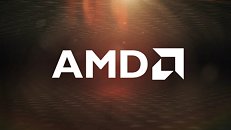

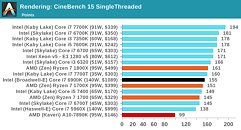
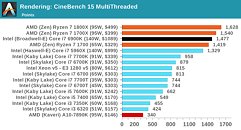
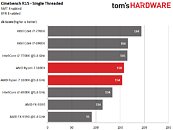
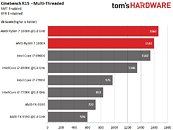
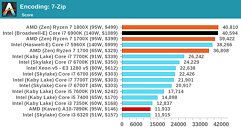
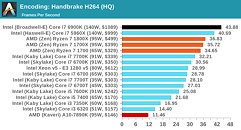
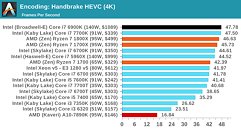
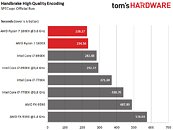
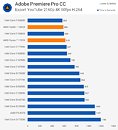
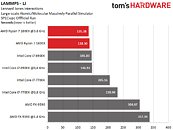
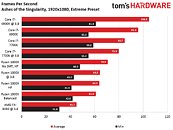
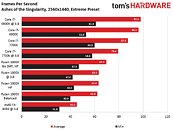
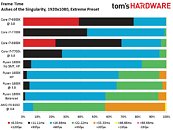
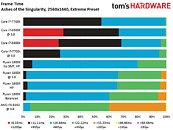
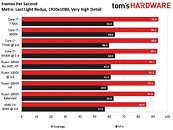
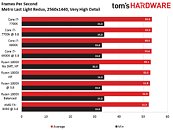

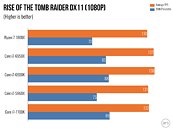
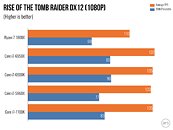
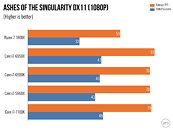
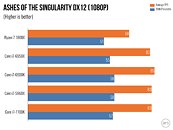
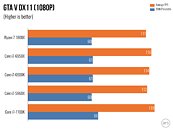
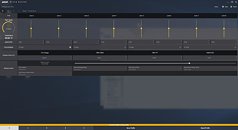
160 Comments on AMD's Ryzen Debut: Onwards to the HEDT Market or The Stumbling Hype Train
I give them the results of GeekBench 4 which is compiled using the same compiler using the same codebase for Linux and Windows - they tell me these are different OS'es so the results cannot be compared even though GeekBench themselves claim even different platforms should be comparable using their benchmark and those guys actually created something, unlike trolls here.
"Designed from the ground-up for cross-platform comparisons, Geekbench 4 allows you to compare system performance across devices, processor architectures, and operating systems. Geekbench 4 supports Android, iOS, macOS, Windows, and Linux."
I want to leave this planet.
AMD fanatics basically know nothing, understand nothing and give the "arguments" which in essence are unrelated blabbering and posturing.
but it's fun time and you also have the rhyme! :rockout:
Intel and RAMBUS. BURNING HOT RAM!!! Also cost a shit ton, and performed worse.
Itanium....
Intel and cartridge problems.
Intel and Hyperthreading on boards that didn't support it out of the box on Intel branded boards (I got to send one back) these were the days before you could do a BIOS update without a CPU installed.
Intel and weak memory controllers, bump your memory voltage to the high side of spec and kill your chip, hint, the IMC terminators were the same process node as the rest of the chip and couldnt handle the voltage
Intel and their love of locking you down, 5% over clocking that may also lead to data corruption ad it increased the PCI speed and caused the IDE and SATA bus to overclock.
Intel Prescott
Intel Northwood
Intel Williamette
Really any of the Pentium 4 chips. Also didn't they bribe or coerce companies to not use AMD? Use, yes they did, as they were scared since AMD was faster, lower power, and more than competitive.
There is no doubt that most reviews have been affected by unfinished EFI, memory incompatibility, SMT and HPET problems, etc... Why rush to review a buggy platform ?
The kind of review I want to see would include Memory scaling/perf, USB3.1G2 and sata transfer speeds, price/perf, etc...
First, there seem to be memory speed issues with the current, early bios revisions. No support for IGMP memory profiles is a good indicator for this. Current benchmarks are comparing somewhat memory speed-hobbled Ryzens against fully optimzed, fully It's likely bios updates coming out in the next couple of weeks will fix these issues and allow the DDR4 to run at higher speeds, which will boost Ryzen's benchmark numbers in several applications.
Second, current video drivers are not at all optimized for Ryzen. Game benchmarks are essentially game driver benchmarks if you consider that most of what is going on is communication between the CPU and the GPU through the drivers. One clue to this is that Ryzen does significantly better running Doom in Vulkan than in OpenGL compared to Intel CPUs and a GTX1080. I'd bet nVidia and AMD can tune their drivers somewhat for Ryzen now that it's out.
Third, a lot of what I'm hearing is that the 7700K, a quad core, 8 thread Intel CPU, is beating an 8 core, 16 thread Ryzen in games. Well, of COURSE it is. Most games are only able to take advantage of 4 threads, and at that point, clock speed becomes the determining factor (along with driver tuning) in performance. I'd wait to see how high AMD's 4 and 6 core Ryzen's can clock before writing off Ryzen's gaming prowess. I'd be willing to bet that a Ryzen 5 4-core, 8-thread CPU will have more overclocking headroom than the 8-core, 16-thread Ryzen.
I recall hoping for Broadwell level IPC..
I'm saying this to make sure that people's expectations are not falsely increased.
You told us that power consumption sucks, I showed you it doesn't.
Now you bring this stupidity with core i5 2500 being on par with Ryzen on geekbench 4.
They are not even close.
i5 2500 is about 3500 single core, 9000 multi core, probably the ones with 4000 are heavy overclocks, as the geekbench doesn't detect very well the cpu speed, but look at the averages. I also see many with 3000, which probably means that is the default value with no overclock.
browser.primatelabs.com/v4/cpu/search?q=i5+2500
R7 is about 4300 single, 20000 multi core, numbers seem much more consistent.
browser.primatelabs.com/v4/cpu/search?utf8=✓&q=1800x
See the difference? Its HUGE.
i7 7700 has better single thread performance at about 4800, and this is the reason for which in lightly threaded loads, games, it beats Ryzen, but 2500 is pretty much dusted by Ryzen, from all perspectives.
I'm not saying by far that Ryzen is perfect, but the problems it has are not the ones pointed by you and its definitely not a train wreck, its a decent part.
I just like competition, and it would be great to have again 2 vendors in the x86 space.
Next Friday (March 10) i'm gonna go for ASRock's Fatal1ty X370 Prof. Gaming if ASUS won't come out with something better looking than CVIH, April 10 - gonna buy me a EKWB's custom liquid cooling loop & G.Skill's Flare X 3466MHz RAM (2x8GB). I hope these RAM sticks will be validated by CPU-Z using this board by then, tho. May 10 - 1800X; let's hope that EFIs, drivers, OSes, etc... get proper Ryzen support by then. And i'd still go for i7 7700K rig as well, even though it'll take me all the way to October the least til it's complete. For comparison's sake, y'know? :) Cheers.
The Geekbench results I showed are from Intel Core 2500 without K which cannot be overclocked by definition. What's more it's my own CPU and I can run any tests you want to show it's not everclocked. Still gonna say it's overlocked?
TDP is really high and you've showed nothing against it.
While I can give you this this and this:
At least 117W:
At least 125W:
At least 106W:
God, why am I arguing with clinical idiots who also "like" each other posts?
www.3dcenter.org/news/amd-ryzen-launchreviews-die-testresultate-zur-anwendungs-performance-im-ueberblick
Regarding whether or not it makes sense to make a review, I think the way TPU handles those is usually interesting. Besides, there are some other things to add to a review other than simple mathematical scores (those have been well documented already.) Ease of use, how did the install go, BIOS state, subjective experience... I think all of those have merit. I know for a fact the review is being conducted as we speak, so, let's see what we can come up with =)
Ryzen has an excellent performance/price ratio in certain scenarios but certainly not all of them. This is hard to swallow I get it, but that doesn't give you the right to call your opponents "trolls".
And the fact that Ryzen is on par with comparable Intel CPUs at 4K/2.5K only indicates the fact that games are stifled by the GPU and no computational power can address this problem unless GPUs becomes substantially faster.
Last but not least AMD's "finewine" will not work with Ryzen: 99.99% of existing games will never be recompiled to support AMD's arch.
A lot of stuff to read and digest:
forums.anandtech.com/threads/ryzen-strictly-technical.2500572/
www.overclock.net/t/1624566/theories-on-why-the-smt-hurts-the-performance-of-gaming-in-ryzen-and-some-recommendations-for-the-future
www.hardware.fr/articles/956-7/impact-smt-ht.html
www.hardware.fr/articles/956-22/retour-sous-systeme-memoire.html
Do you have anything to do with software development? I'm quite sure absolutely nothing 'cause if you had, then you'd never mention some future game consoles or CPUs. We are talking about current games and current CPUs. Can you even read, sir? It's not an offense but my post clearly talked about existing games, yet you need to mention some future yet to be seen products.
That's the problem with the AMD fans: they live by waiting for the miracles of future optimizations specifically for AMD products. TWIMTP causes an incredible butthurt and all the hell breaks lose and you're screaming that NVIDIA is basically cheating and lying and they are just pure evil, while AMD says they directly sponsored (read: paid) DICE, Bethesda and 300 other studios to make their games run better on AMD GPUs, and no one bats an eyelid.
Freaking hypocrisy from AMD fans all day long, 365 days a year.We'll see. I'm 99.99% sure Windows 7 won't have any updates to support Ryzen better, while Windows 10 is still hated by far too many and even its nightly builds don't have any optimizations to address this issue.